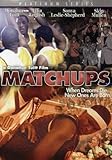 Matchups is the true (yet unfortunately badly acted and low budget) story of Ian “Wonder Boy” Williams, the legally blind-in-one-eye high school basketball player who at one point was college basketball Player of the Year when an on-court accident (shown in the movie as a lot of writhing around on the floor clutching an eye) means the loss of sight in his other eye.
Matchups is the true (yet unfortunately badly acted and low budget) story of Ian “Wonder Boy” Williams, the legally blind-in-one-eye high school basketball player who at one point was college basketball Player of the Year when an on-court accident (shown in the movie as a lot of writhing around on the floor clutching an eye) means the loss of sight in his other eye.
The movie does not depict Ian’s time learning how to be blind, but skips ahead to three years later, when he’s married and employed as a telemarketer. The producers clearly consulted disability organizations for advice here, as accurate adaptations to his keyboard and periodicals for the blind are seen on his desk. Then one day, Ian’s hoop dreams of a national championship are suddenly revived when he gets a phone call asking him to talk to a wayward player and convince him to get back on track with a promise of financial assistance. Seemingly through a series of errors, this leads to him getting hired in some sort of advisory role that quickly turns into coaching when the entire basketball program staff is suddenly fired. (The college administration seems unwilling to actually administrate, speaks about cutting the program entirely, and seems to hint at some sort of graft or corruption going on. One wonders if they deliberately brought in the blind guy to try and kill the basketball program for good.)
But Ian has other plans. Though he spends half the time doing nothing but making inspiring “win one for the cripple” speeches in a hoarse, sickly voice, occasionally he offers unexpected insights into his players’ technical abilities and even demonstrates that he knows his, and others’, positions on the court. The only player to figure out how he does this is a fellow person with a disability, who spends the entire season using crutches and a knee brace. (Whether this character is based on a real player or just added to heighten the pathos and indicate just what dire straits the team is in is not explained.) Ian exhorts him to “make the court his own”, and one day while alone the injured player laboriously gets down on his hands and knees to discover that Ian has indeed made the court his own, by taping pennies at regular intervals to resonate against the soles of his shoes.
You don’t have to be better than all your opponents, Ian explains to his team. You just have to be better than the one you’re matched up against, and trust that your team will carry the day. (And then his loyal players nod in agreement, a gesture lost on a blind person.)
Ian leads his team to a personal and professional triumph, teaching others what every disabled person has learned; that dreams do not die when one experiences disability. They may have to be altered just a little, though.
